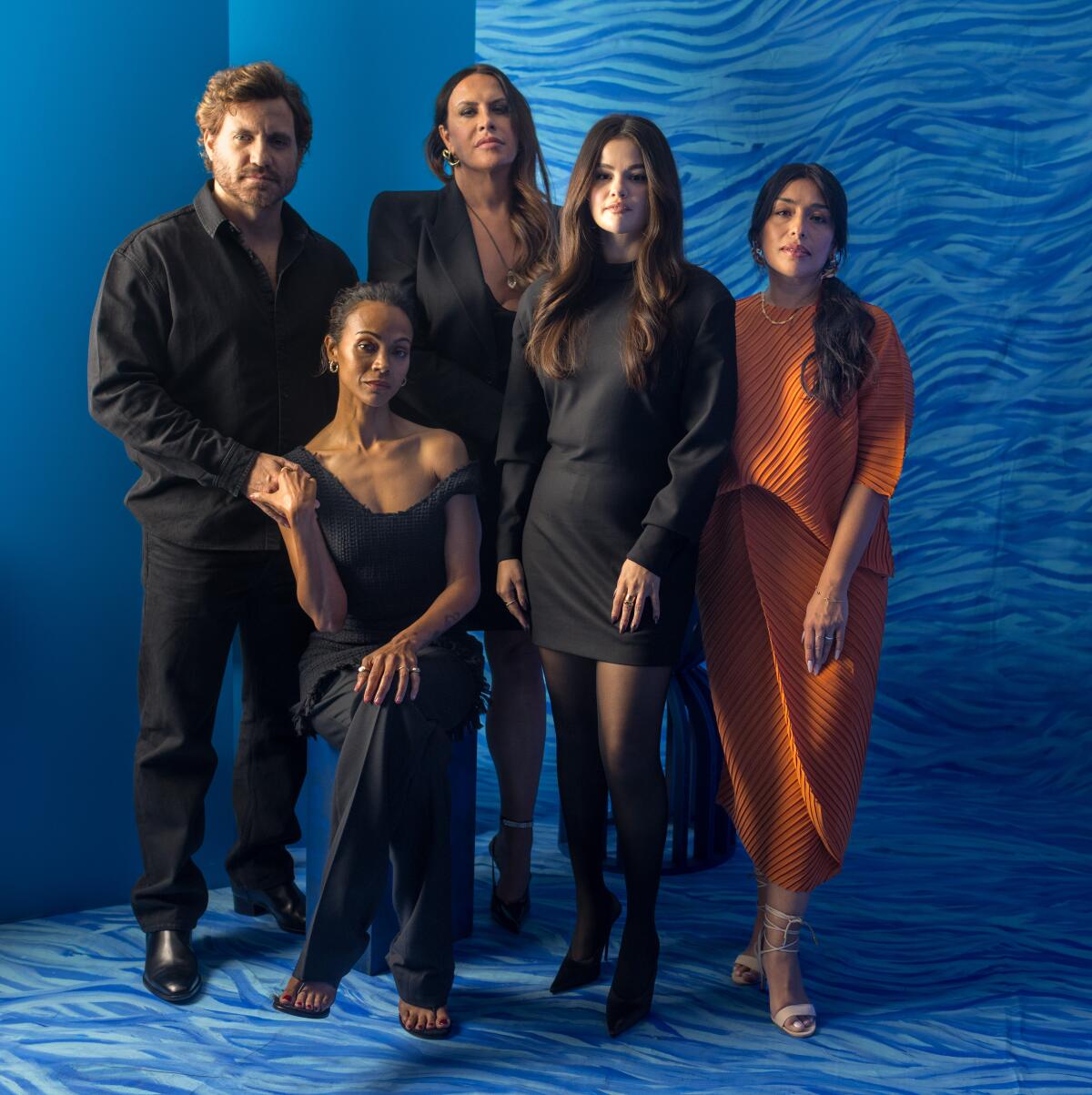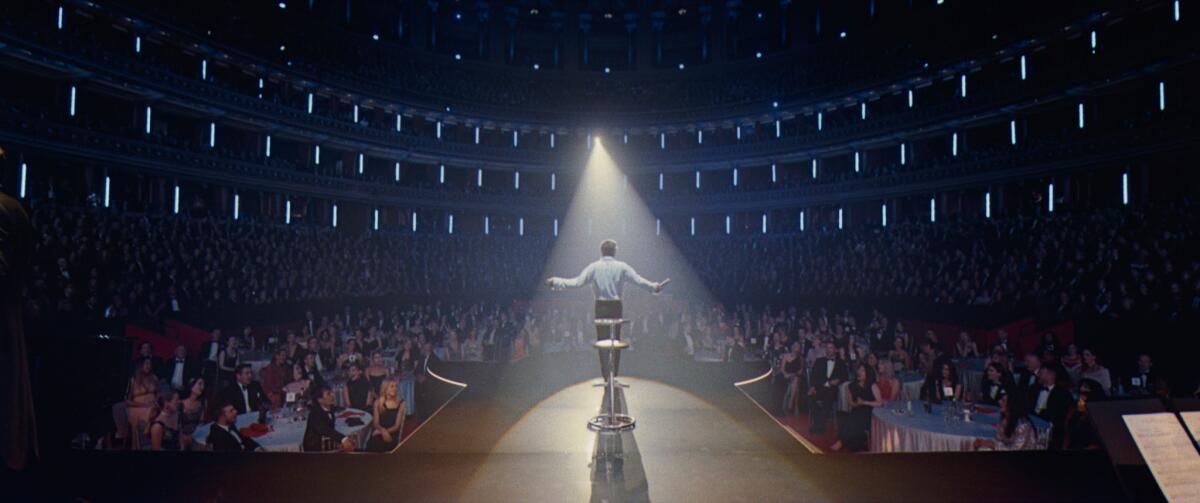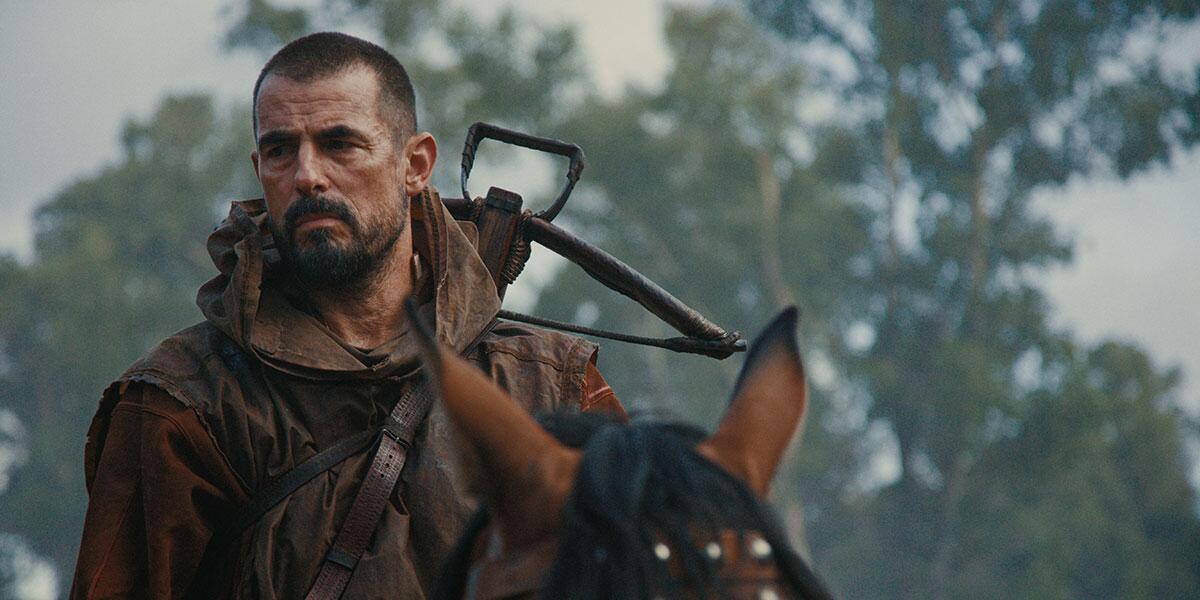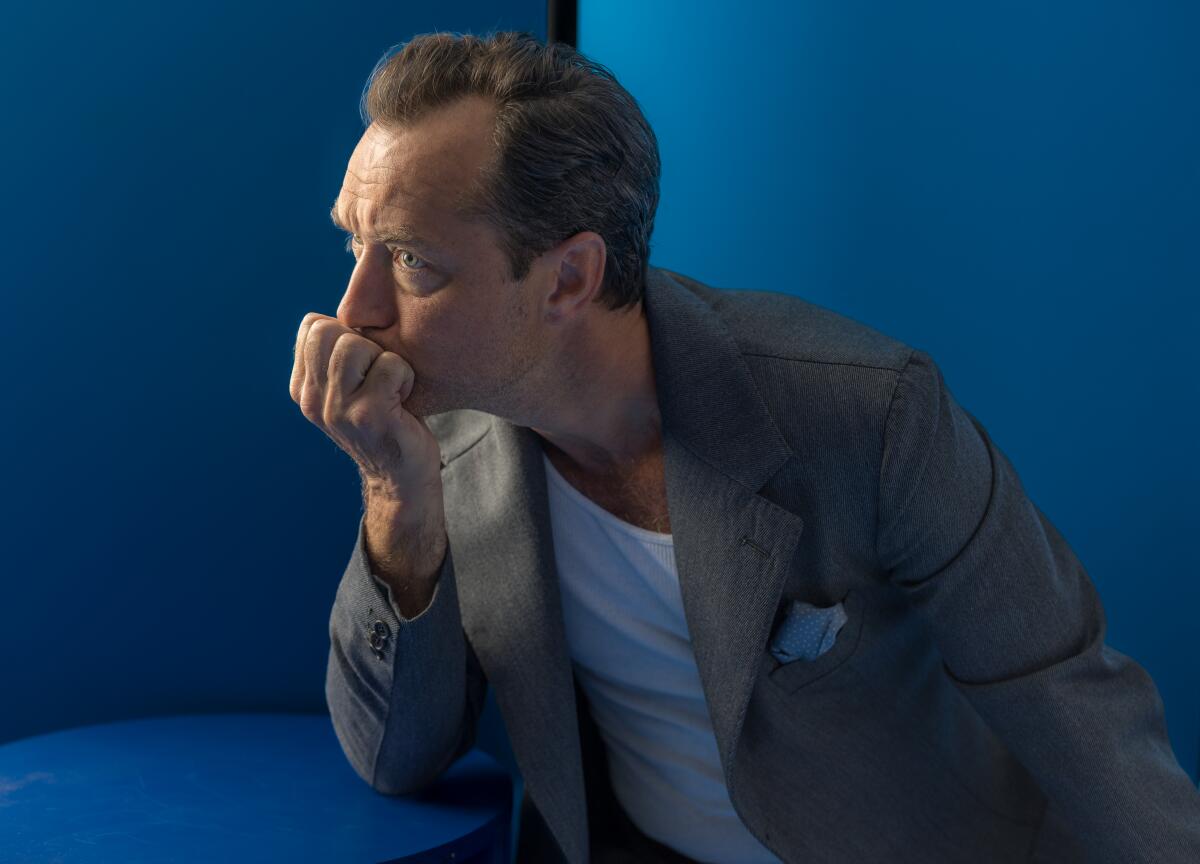Why a Frenchman was the right director for women-led, Mexico-set ‘Emilia Perez’

TORONTO — Welcome to our fourth and final special edition of the Envelope newsletter from the 2024 Toronto International Festival. Thank you for joining the entertainment experts at The Times for interviews, opinion and analysis from one of the events that traditionally kicks off the Oscar race. See you back in L.A. — and sign up here to get more of The Envelope in your inbox.
From the Oscars to the Emmys.
Get the Envelope newsletter for exclusive awards season coverage, behind-the-scenes stories from the Envelope podcast and columnist Glenn Whipp’s must-read analysis.
You may occasionally receive promotional content from the Los Angeles Times.
The day’s buzziest premieres

At least since “Walk Hard: The Dewey Cox” story was released almost two decades ago, it’s been clear that the musical biopic is in desperate need of reinvention, yet Hollywood keeps churning out reductive movies about complicated artists whose lives don’t neatly follow a three-act structure.
Enter “Better Man,” a film about cheeky British pop star Robbie Williams from “The Greatest Showman” director Michael Gracey. Williams’ life story follows many of the familiar beats: He rose to fame as the youngest member of the ’90s boy band Take That, descended into drug and alcohol abuse, left the group and charted a successful solo career. Yet there is one thing that sets this film apart from countless by-the-numbers biopics. Williams is played not by a young actor doing the absolute most in a quest for an Oscar nomination, but by a CGI monkey. Yes, you read that correctly. So is the monkey … a symbol of something? A huge joke? Will this movie make any sense? I have no idea, but I can’t wait to find out. —Meredith Blake
Other notable premieres Monday include “Disclaimer,” a series written and directed by Alfonso Cuarón and starring Cate Blanchett as a journalist with a dark secret in her past, and “I’m Still Here,” a historical drama from Walter Salles, set during Brazil’s military dictatorship in the 1970s. Find the full Monday schedule here.
READ MORE: Anderson .Paak called in big-name favors to make ‘K-Pops’ sing: ‘I owe a lot of people’
An awards contender to watch for

“William Tell” (international feature, Switzerland)
Should Switzerland want an Oscar, “William Tell” mounts a convincing case. The Swiss fight for independence against the Austrian Hapsburgs is mythologized in director Nick Hamm’s throwback take on the eponymous folk hero. Led by a fierce Claes Bang, the 14th century-set film is reminiscent of the swashbuckling action-adventure movies of the early aughts, standing toe-to-toe with such films as “Gladiator” and “The Pirates of the Caribbean,” which were themselves building on the legacy of Hollywood’s golden age heroes. Throw in a dash of the war tactics seen in the internet’s favorite battle scene in “The Lord of the Rings: The Two Towers” and “William Tell” boasts genuine crowd-pleaser status.
After the film’s cold open reminds us why we know Tell (he’s the guy who shot an apple off someone’s head with a bow and arrow), we cut back to just several days earlier in what can be described as Switzerland’s most impactful record-scratch, freeze-frame moment.
What follows is a Robin Hood-like rise from small-town hero to mythic figure as the former soldier for the Holy Roman Empire assembles a ragtag team of men and women who’ve been wronged by the arch villainy of Connor Swindells and Austrian Hapsburg ruler Ben Kingsley, who is chewing scenery while festooned with a golden eye patch.
We eventually circle back to the iconic apple-on-the-head moment, though Hamm directs it with all the dread of a “Saw” trap. As Tell is forced to point his bow at his son, he relives the first time he pulled an arrow: the moment he killed a fellow Holy Roman Empire soldier in the Crusades, saving the Muslim boy and his mother with whom he would form a family. Now, years later, he’s faced with another difficult choice. But we all know how this story ends. Except we’re only halfway through the movie!
Hamm’s action choreography meets the vast scope of his story, and even better, it’s complemented by a brutish and affecting ensemble of actors, including Goldshifteh Farahani, Rafe Spall and Jonah Hauer King. Given the spectacular delights the film has to offer, perhaps this viewer was asking too much to include one scene set to the “William Tell Overture.” Perhaps Hamm has woven a tale worthy of such grand proportions that to include the melody would be redundant. —David Viramontes
Looking for more in-depth coverage on all things Envelope?
Shop our collection of The Envelope magazines today.
Q&A of the day

Undoubtedly one of the most exciting and original films of the year is “Emilia Perez,” which plays at TIFF on Monday night. Directed by Jacques Audiard, the French master of mixing genres in films such as “A Prophet,” “Rust and Bone” and “The Sisters Brothers,” the film is a dramatic crime saga about a Mexican drug lord who transitions to being a woman. And it’s also a musical. The film stars Karla Sofía Gascón in the title role and the cast also includes Edgar Ramirez, Adriana Paz, Zoe Saldana and Selena Gomez. When the film premiered at the Cannes Film Festival earlier this year, the jury jointly awarded Gascón, Paz, Saldana and Gomez with the best actress prize. On Sunday, the film’s cast stopped by the L.A. Times studio to chat. —Mark Olsen
WATCH: Our full interview with the cast of ‘Emilia Perez’
Selena, you recently posted a video of yourself bursting into tears of joy when you first found out you had been cast in the movie. Why was it so meaningful to you even before shooting the movie?
Selena Gomez: For multiple reasons. First, foremost, I’m a huge fan of Jacques. I had just recently watched his movies and I fell in love with the script. And then from there, it just honestly was a no-brainer. But I wanted this part so bad, I just knew it was going to be special. I definitely didn’t expect all the great things, but we worked really hard. We followed Karla’s lead and it was amazing.
Edgar, I find when I try to describe the story to people, it’s hard to explain. How did you find the story when you first read it?
Edgar Ramirez: It’s true, it’s not an easy movie to just point out, “This movie’s about this.” And I join Selena’s opinion on Jacques. I’m a huge fan of Jacques. He’s one of the best directors in the world, who always exhibits a very profound curiosity and compassion toward his characters and his subjects. Who takes risks, always delves himself into worlds that are miles and miles apart from himself, but in a very respectful and compassionate way. We’re all Latin American. I mean, this is a full Latin cast. And this is a very, very Latin American story directed by a French man, who actually did it with the utmost compassion. And what I felt reading the script, to go straight to your question, is that he did not, and never has in his entire filmography, he has never shied away from confronting contradiction. These characters are all filled with contradictions.
The polarity of the characters change constantly, all of them, they exhibit very violent, very questionable traits and also very tender, very relatable traits. And that’s basically the human complexity. Because human nature is complicated, human nature has multiple layers. And I think that’s why the movie’s so interesting. I’m so lucky that I was part of an effort to tell the stories of these four interesting women, because it’s a story of Latin America portrayed through the lives of four women who are trying to find their authenticity, to reclaim their identity, their agency, their independence and their freedom. I think that ultimately this is a movie about freedom. Freedom from society, freedom from yourself, freedom from your burdens, from your sins, from your sense of guilt and the possibility of change and the possibility of having second chances, of doing it all over again.
Adriana, you have a very successful career in Mexico. Has it been meaningful to you that this movie in particular is the one that’s breaking you to a wider international audience?
Adriana Paz: Of course. Here we are here in Toronto; this is my second time, but this movie is huge. And I also admire Jacques Audiard. And I feel that when you see Jacques Audiard movies, they are all different but they share something in particular for me, and I think you’re going to agree. It’s love. Love and commitment. Not with society, with yourself. And it’s what makes his movies so tender and so important.
Jacques Audiard, who’s crazy in the best way because he’s never attached to his own ideas and he’s always open. And that’s challenging. He was like, “OK, we’re going to do this scene this way.” And then the next day he is like, “No, that is not working. ... I have been watching Selena and Zoe and Karla and let’s try another thing.” That’s amazing because that is playing itself. And I think that brings the movie this vitality and its creativity.
Zoe, the movie is among many things a musical, and a lot of people have noted that it really draws on the breadth of your talents, singing and dancing and having a dramatic performance. Is that something that appealed to you right from the start?
Zoe Saldana Yes, it did. But in a sense of like, “Oh, I can do those things.” I danced my whole life, my whole childhood. I sing in the shower, but I’ve never really pursued it professionally. I mean, I did a couple of songs in the “My Little Pony” movie and then “The Book of Life,” but never really pursued this as a career. And Jacques really gave me this whole package that was so challenging, so enticing, and he made me feel welcomed to come and play. So it wasn’t like something that I just felt I’m throwing myself into this unknown and I hope I don’t fail because it’ll be a scary thing. No, no, no, he wanted you to bring all your nuances, your interpretation of your character and remain open so that he can mold you like clay. And that’s what I did. And I think that my background as a dancer gave permission, gave me access to be able to do that for him. It was a reconnection that I never thought I was ever going to have. It’s a part of my craft that I’ve yearned to reconnect with and he gave me that, in the form of [the character] Rita. So I’m really grateful.
And at the end, the core of all of this is this desire to be free of the conventional sort of molds that she has been confined to. And the fact that Jacques carried it as a male, he carried it with so much [sensitivity], but also audaciousness. And it was amazing. It really felt like, “OK, I can be my most authentic self as Rita and know that he’s going to capture it.” He’s just going to chip away and find whatever sculpture he’s looking for in all of us.
Karla, besides being the story of a cartel and a musical, the film is also a very nuanced portrayal of the trans experience. Was that an important aspect of the movie to you? What did that mean to you?
Karla Sofía Gascón: To me it means a step forward for a minority of people that have been set aside, that have been rejected by society. And I recently had the opportunity to say this in another interview: I feel like the Joker was, in the movie, somebody who had been bullied and ostracized and rejected and then he has an opportunity to change things for the better. But unlike what the Joker does, which is ending up destroying everything, I feel that thanks to the character of Emilia and thanks to what has been happening to me recently, what we can do is leave a message to people where we say that things can change for real, that there is a different world that’s possible. A different world in which things can be different and in which people don’t need to be influenced negatively by society. So the overall message is, yes, we can.
Inside the L.A. Times Studio

SEE MORE: Selena Gomez, Jude Law, Sydney Sweeney and more visit L.A. Times Studio at TIFF
WATCH: Jude Law, Jurnee Smollett and more talk about ‘The Order’
WATCH: Mikey Madison and Sean Baker talk stunts and the theater experience with ‘Anora’
WATCH: Elizabeth Olsen, Alicia Vikander talk about emotional connections in ‘The Assessment’
WATCH: Which ‘SNL’ era is the best? The team behind ‘Saturday Night’ start drama
WATCH: Sydney Sweeney and Ana De Armas talk ‘Eden,’ a darker Ron Howard film than usual
Feedback?
I’d love to hear from you. Email me at [email protected].
Can’t get enough about awards season? Follow me at @glennwhipp on Twitter.
Only good movies
Get the Indie Focus newsletter, Mark Olsen's weekly guide to the world of cinema.
You may occasionally receive promotional content from the Los Angeles Times.





